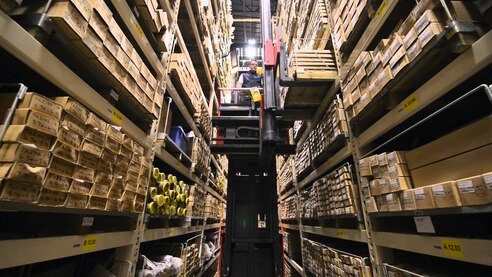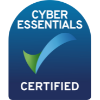Employer case study: British Geological Survey
The British Geological Survey (BGS) is a world-leading geological survey. It offers expert services and impartial advice in all areas of earth science, with the ultimate aims of promoting responsible use of natural resources; environmental change management; and resilience to environmental hazards.
Here Denise Langley, HR Business Partner, and Sue Roper, GeoInformation Collection Coordinator at BGS’ Data Centre, explain why apprentices can be the perfect fit for BGS’ work.
Why we chose Access Training
Denise describes what led BGS to work with Access Training,
“When the Government introduced the new Apprenticeship Levy in 2017, I was involved in the selection of two different apprenticeship providers in the area of Business Administration: a local college and Access Training.
“It soon became clear that Access Training’s model was highly suited to our business. Since their focus is on workplace training – as opposed to workplace alongside more traditional training on 6th form subjects – they had an innate understanding of how their support needed to be tailored. In practical terms, they work around us, eg arranging assessments on site which negates the need for our apprentices to travel elsewhere, and allows manager input to be provided at the same time.
“This positive early experience led to the decision to use Access as our provider of choice for a number of further Business Administration apprentices. The continuity of using the same training assessor has had a number of advantages both for us and the apprentices themselves.
“Over the past four years, eight individuals have undertaken or in the process of undertaking either a Level 2 or Level 3 Business Administration apprentice with Access. Many have been recruited into the organisation and have gone on to secure permanent employ with us. In fact, Lillian Cullen-Coates – who I’m happy to say won the Business Administration category of the 2019 Access Training Apprenticeship Awards – first joined us as a Level 2 Business Administration apprentice and went on to study Level 3 once she had embarked on a substantive post. She has subsequently been promoted.”
What we look for in our apprentices
Sue shares her perspective as a line manager of apprentices,
“Following the successful employment of a number of apprentices across BGS in the previous few years, in 2018 we decided to recruit two new apprentices within the Data Centre team. The Data Centre role within BGS is to collect, ingest, store and make data available for the public good.
“We found that so many elements of the programme applied well to our work; as an example, Level 2 Business Administration was particularly well aligned to the tasks of collecting data, file structure and storage. Where criteria were less relevant, we worked with our Trainer Assessor at Access, Lisa Rooks, to adapt accordingly.
“Soon after this, our team worked on a large data-accessioning project, where the apprentices were in a great position and became vital team members.
“Data can be deposited at the data centre voluntarily or under legislation such as the Water Resources Act and the Oil and Gas industry regulations. It is preferred we hold data as ‘open data’ with no access or use constraints, making them publically accessible to all with an appropriate Open Government Licence (OGL) statement.
“As much of our work is in the public domain, accuracy and attention to detail are imperative in our work. These are qualities we look for when recruiting our apprentices. We also look for candidates who are confident in asking questions to build their own knowledge, as well as a commitment to checking and double-checking their own work. It’s often been the case that once our apprentices have achieved their qualification, BGS have offered them permanent roles. This has been the case for one of our Data Centre apprentices and we hope to follow this pattern in the future.
“As a manager of apprentices, I keep a firm eye on tasks they might undertake in order to evidence their learning. This gives them the opportunity to further develop themselves by stepping up to tasks that wouldn’t normally be part of their role (like writing up procedures as well as elements of project management) and sets them firmly on the path for career progression.”
Apprenticeships as part of our succession planning
Sue continues,
Here Denise Langley, HR Business Partner, and Sue Roper, GeoInformation Collection Coordinator at BGS’ Data Centre, explain why apprentices can be the perfect fit for BGS’ work.
Why we chose Access Training
Denise describes what led BGS to work with Access Training,
“When the Government introduced the new Apprenticeship Levy in 2017, I was involved in the selection of two different apprenticeship providers in the area of Business Administration: a local college and Access Training.
“It soon became clear that Access Training’s model was highly suited to our business. Since their focus is on workplace training – as opposed to workplace alongside more traditional training on 6th form subjects – they had an innate understanding of how their support needed to be tailored. In practical terms, they work around us, eg arranging assessments on site which negates the need for our apprentices to travel elsewhere, and allows manager input to be provided at the same time.
“This positive early experience led to the decision to use Access as our provider of choice for a number of further Business Administration apprentices. The continuity of using the same training assessor has had a number of advantages both for us and the apprentices themselves.
“Over the past four years, eight individuals have undertaken or in the process of undertaking either a Level 2 or Level 3 Business Administration apprentice with Access. Many have been recruited into the organisation and have gone on to secure permanent employ with us. In fact, Lillian Cullen-Coates – who I’m happy to say won the Business Administration category of the 2019 Access Training Apprenticeship Awards – first joined us as a Level 2 Business Administration apprentice and went on to study Level 3 once she had embarked on a substantive post. She has subsequently been promoted.”
What we look for in our apprentices
Sue shares her perspective as a line manager of apprentices,
“Following the successful employment of a number of apprentices across BGS in the previous few years, in 2018 we decided to recruit two new apprentices within the Data Centre team. The Data Centre role within BGS is to collect, ingest, store and make data available for the public good.
“We found that so many elements of the programme applied well to our work; as an example, Level 2 Business Administration was particularly well aligned to the tasks of collecting data, file structure and storage. Where criteria were less relevant, we worked with our Trainer Assessor at Access, Lisa Rooks, to adapt accordingly.
“Soon after this, our team worked on a large data-accessioning project, where the apprentices were in a great position and became vital team members.
“Data can be deposited at the data centre voluntarily or under legislation such as the Water Resources Act and the Oil and Gas industry regulations. It is preferred we hold data as ‘open data’ with no access or use constraints, making them publically accessible to all with an appropriate Open Government Licence (OGL) statement.
“As much of our work is in the public domain, accuracy and attention to detail are imperative in our work. These are qualities we look for when recruiting our apprentices. We also look for candidates who are confident in asking questions to build their own knowledge, as well as a commitment to checking and double-checking their own work. It’s often been the case that once our apprentices have achieved their qualification, BGS have offered them permanent roles. This has been the case for one of our Data Centre apprentices and we hope to follow this pattern in the future.
“As a manager of apprentices, I keep a firm eye on tasks they might undertake in order to evidence their learning. This gives them the opportunity to further develop themselves by stepping up to tasks that wouldn’t normally be part of their role (like writing up procedures as well as elements of project management) and sets them firmly on the path for career progression.”
Apprenticeships as part of our succession planning
Sue continues,
“Some of us have been with the organisation for many years and it’s important that we’re able to transfer that wealth of knowledge to our future workforce generation. Apprenticeships present the perfect channel for this and, as such, are an integral part of our succession planning. The fresh injection of talent, energy and different perspectives that an apprentice brings has had a positive impact in so many ways.”
Share this post
















